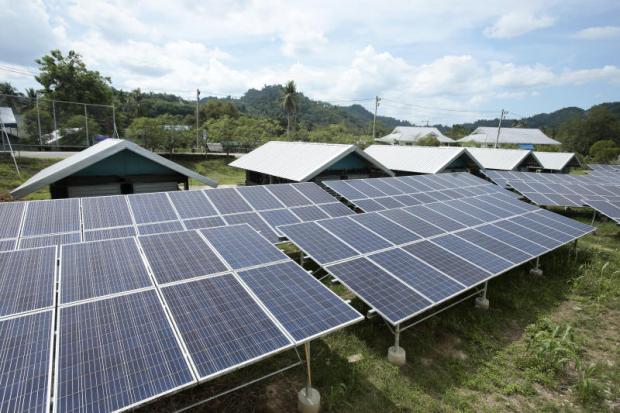
It has become clear to many that the global trend of renewable energy development, particularly solar energy, is unstoppable.
For some strange reason, that has, however, not become clear to energy officials and policymakers. But there are now good signs that Thai policymakers have finally come around to acknowledging the reality.
The Bangkok Post reported early this week that energy policymakers are making plans to develop a system for trading electricity among households, and a business model for retail power trading.
New regulations will be drafted to transform traditional power distribution from large power plants into a decentralised system using blockchain technology.
Speaking at a seminar, Viraphol Jirapraditkul, a member of the Energy Regulatory Commission, said the new regulations will serve the rapid increase in solar photovoltaic rooftops and independent power producers over the last two years.
"Solar power will be the new direction of the power trading business," he said.
Importantly, the new regulations will address the issue of fees for power transmission through the national grid and power backup for when power demand after sunset shifts to rely on traditional power plants.
In the past, energy officials have raised objections to solar power promotion based on fears that solar power generation on a wide scale would disrupt the current transmission schedule and backup system.
With solar power generating electricity in the daytime, the peak power demand would shift to night time, and a reliable backup system needs to be maintained because of inconsistency in solar power generation.
These are legitimate concerns. But they are not good enough reasons to impede renewable energy development.
I appreciate that tackling these challenges requires policy and engineering ingenuity as well as financial and human resources. However, developments in other, usually more advanced countries have shown that there are practical solutions, which means we don't have to start from zero.
What is required of officials in this instance is an open mind to accept change and willingness to work for the public interest.
Mr Viraphol argued for fees on solar power producers to "be fair to traditional power plants" because "there will be fewer power generators for standby electricity".
However, I'm not convinced that renewable energy producers, particularly at the household level, should be subjected to additional fees for changes to the transmission and power reserve systems.
For too long, the Thai government has been slow to adopt renewable energy production and half-hearted in promoting it.
While residents in more advanced countries enjoy government subsidies, Thais who are interested in the technology either have to bear the full cost of installation or wait for state aid that is highly uncertain. Now, let's consider what would happen if renewable energy becomes more widespread.
The traditional power generation industry will have to undergo tremendous change at probably considerable costs. However, it would continue to provide base power production, and distribution and backup systems.
On the other hand, power distribution will become decentralised so that power production and usage would be more accessible. New installations can be made quickly and need not wait years to become operational.
The government does not need to build any more traditional power plants. It only has to maintain existing ones and perhaps retire some of them over time. There is no need to maintain as much power reserve, which now stands at close to 40% of peak demand.
There's also no need for any more traditional -- and expensive -- power plants which require years to build and causes severe environmental impacts.
All of these amount to great savings for governmental outlays. These savings can be used to implement required changes to the traditional power distribution and reserve systems without imposing burdens on household solar power producers.
Renewables also enhance energy security. A decentralised system means problems at any part of the system do not cause widespread outage.
Fuels are free and year-round, more or less. System maintenance is minimal because there are few parts to maintain. Power demand will be higher but it will be met by renewable energy, particularly solar and wind, of which average cost has already dropped below that of coal.
We are also at a junction in world history where internal combustion will be replaced by electric motors.
A Business Insider report on May 8, citing "Lazard's Levelized Cost of Energy Analysis", says the cost of producing solar power has dropped to US$50 (1,600 baht) per megawatt-hour while coal costs $102.
And this cost is expected to decline further. Business Insider concludes that this recent change "could be a sign that the world is on the verge of an energy revolution".
Given all these developments, it's only logical to shift away from fossil fuels in favour of renewable energy.
For this reason, there is no longer any rationale for not abandoning plans to build coal-fired power plants in the South or elsewhere in the country.
Wasant Techawongtham is a former news editor, Bangkok Post.
